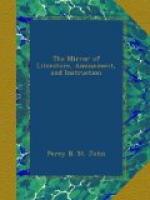But, though we will not go back to the dreams of our forefathers, (who, if they had more genius, had fewer materials for it to work upon than their servile children,) yet we must always make the Bible an exception, and in the present case we find it expedient as well as becoming, to refer to that oldest and most valuable of records. We have there no express mention of eating flesh before the Flood; but, on the contrary, a direct command that man should subsist on the fruits of the earth. ("Behold I have given you every herb bearing seed which is upon the face of the earth, and every tree in the which is the fruit of a tree yielding seed; to you it shall be for meat”—Gen. i. 29.)
After the Flood, when the Israelites were distressed for want of food in the Wilderness, we find that it was sent to them from heaven in a vegetable form, and to denote its divine origin and its superior excellency, it is called in the Scriptures “the corn of heaven,” and “angels’ food,” &c. Oftener than once this favoured but ungrateful people despised and loathed this miraculous provision; they called out for animal food, and accordingly quails were sent them, but they were punished with destruction by the flesh which they desired; ("And while the flesh was yet between their teeth, ere it was chewed, the wrath of the Lord was kindled against the people, and the Lord smote the people with a very great plague.”—Numb. xi. 33.)
Thus in the first ages of the world, and during the shepherd state of society, men lived upon berries, and such fruits as the earth spontaneously produced; we have mentioned generally how the philosophers of Greece and Rome preferred to live, and there are not wanting instances of men bred up in the sensuality of modern times who have followed their example. The philosopher, Franklin, who reached a great age, for a considerable portion of his life kept entirely to a vegetable diet; and Abernethy, a name yet more familiar in our ears, has left us this maxim, that “a vegetable diet and abstinence from fermented liquors tends more than anything else to tranquillize the system.”—(vide the Abernethian Code.) Another popular and scientific writer of the present day makes a similar confession, which coming from such an unexpected quarter carries weight: “Although professedly friends to gastronomy, moderated by a decided aversion to anything like sensuality, we are of opinion that man is less fit to feed upon carnal than vegetable substance.” (Accum’s Culinary Chemistry.)
The author of The Art of Improving Health, has also a passage in point: “An animal diet, especially in temperate climates, is more wasting than a vegetable; because it excites by its stimulating qualities a fever after every meal, by which the springs of life are urged into constant and weakening exertions: on the contrary, a vegetable diet tends to preserve a delicacy of feeling, a liveliness of imagination, and an acuteness of judgment, seldom enjoyed by those




